On our love of monsters
In The Last Jedi, director Rian Johnson's was playing off audience's expectations from messed-up young hot male villains. "This isn't going to go the way you think."
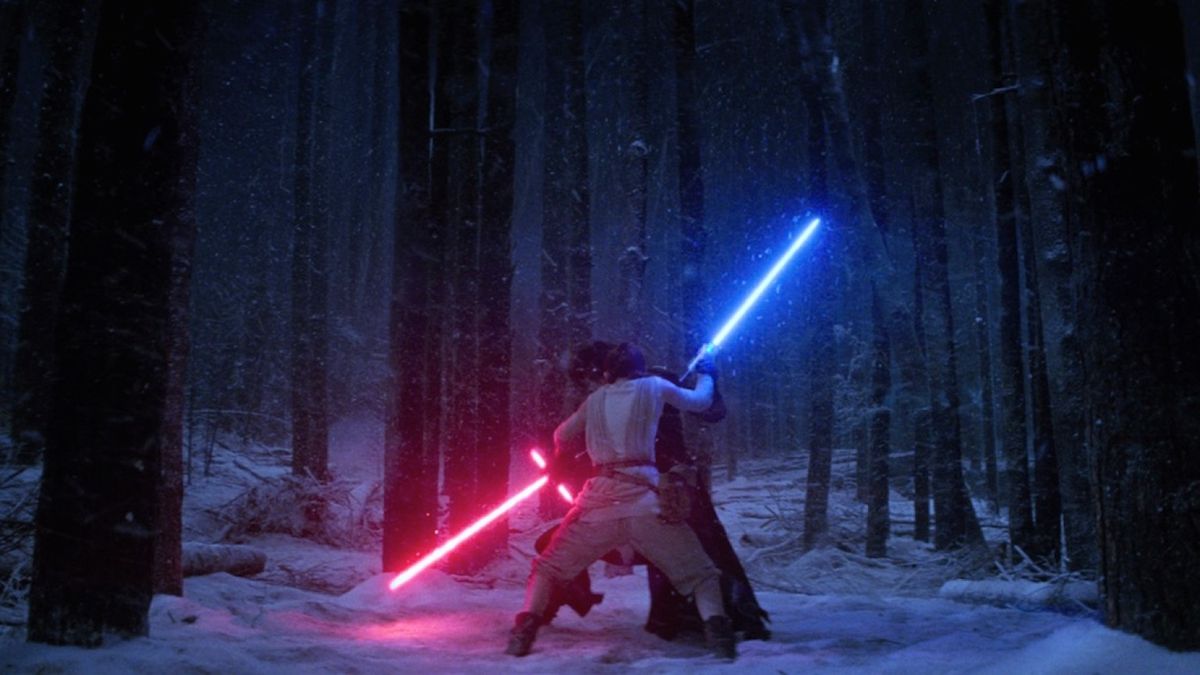
In the hours and days since seeing The Last Jedi one of the more recurring comments I've heard coming from my friends is complete consternation at the fact that Kylo Ren is so beloved by so many viewers. I've been hearing a lot of: "Isn't he a murderous space fascist?" The short and quick of it is that, in my opinion, what's happening here is a case of Draco In Leather Pants [1], when an audience or readership takes a villainous character and portrays them as a lovable person, especially in fanfiction or fanart. It's a familiar remix of The Beauty and The Beast story. While being loved, usually by a sexy love interest the audience identifies with, the Villain learns that he is more than a monster, and embarks upon the path of redemption. It usually helps if the Villain In Leather Pants is really hot. That's the short answer: audiences want a character who falls in love so completely that it transforms them. It plays into saviour fantasies. But I want to dig a little deeper into Kylo Ren's portrayal in The Last Jedi and look at how it plays off these "fangirl fantasies", because I think director Rian Johnson's was playing with his audience's expectations from young hot male villains.
 Hel-lo, Adam Driver. I do not know why this photo exists, but I find it hilarious.
Hel-lo, Adam Driver. I do not know why this photo exists, but I find it hilarious.
Everything beyond this point may be a spoiler, for any of the released Star Wars films and animated shows, up to and including The Last Jedi, as well as for the canon novelization of The Force Awakens and the Leia-centric canon novel Bloodlines. Content warnings include discussions of domestic violence and child abuse.
It goes all the way back to Anakin
During the climax of Return of the Jedi, Luke Skywalker surrenders to Imperial troopers, tells his father Darth Vader that he loves him, and Vader, after watching his son resist being tortured by his master, is suddenly overwhelmed with feelings of love and care for someone other than himself for the first time since he choked and knocked his pregnant wife Padmé unconscious, and sacrifices himself to save Luke from Emperor Palpatine.
The film tells us that after a lifetime of being a murdering destroyer of worlds, Anakin Skywalker was redeemed because of this sacrifice. Through Luke's love for his estranged father, we accept Anakin's redemption in death as his Force ghost stands besides Obi Wan Kenobi and Yoda, signalling to us that Anakin's turn back to the light side of the Force was successful.
And, in a way, Darth Vader/Anakin Skywalker's death is a convenience — or perhaps relief is the better term — because had he survived, no doubt the rebuilt Republic would have had him tried for his war crimes and likely executed him, and it would be impossible to watch Luke through that. (A young Return of The Jedi Leia would probably tell her dad to go to hell. But her heart would break for Luke, too.)
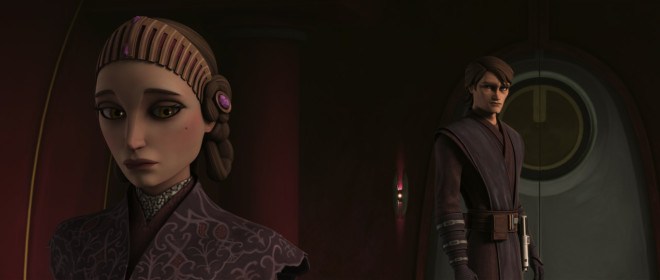
Anakin Skywalker's transgressions are many, and the horrors run deep. In Revenge of the Sith and the last few seasons of the animated Clone Wars series, we are repeatedly shown a man who is becoming more twisted by the dark side of the Force under the unflinching attention of Palpatine, who has been grooming Anakin since he was a young initiate at the Jedi Academy. Along the way and into their marriage, Anakin's behaviour with Padmé becomes increasingly worrisome from the perspective of anyone who has witnessed domestic abuse first-hand. Their secret relationship becomes an isolating emotional quagmire of abuse and deceptions, and eventually Anakin begins to terrify Padmé with fits of violent anger. During an episode of season 6, she wants their relationship to end because, in her words, she doesn't trust him any more. She even tells him: "I don't feel safe." [2] Their relationship does not actually end there. It endures, and it becomes even more isolating and frightening for Padmé. It culminates in their last scene together in Revenge of the Sith on the surface of Mustafar, where a furious Anakin uses the Force to choke Padmé unconscious, though he believes he has just killed her. Mustafar is the same planet which later in the series is rumoured to be "the place where Jedi go to die", a rumour which develops because it is thought that Mustafar is where Darth Vader brought the last of the scattered hidden Jedi to be tortured and executed. [3] We discover in the animated series Star Wars Rebels that the planet is also where Darth Vader's minions brought Force-sensitive infants and children to be tortured and brainwashed into the service of Emperor Palpatine. [4] In its symbolic importance (the planet literally looks like a hellscape), Star Wars wants us to consider Mustafar to be Anakin's the place where he capital-F Fell to The Dark Side and was reborn Darth Vader. But Clone Wars demonstrates to us that Darth Vader was not created all at once. Mustafar is perhaps the first time he'd ever been physically violent towards Padmé, but Anakin had made terrible choices — including the murder of children and innocents — long before he tried to kill his wife.
Almost every horror that Anakin Skywalker committed cannot be deflected as he is accepted back into the fold of the light upon his death. And George Lucas was always adamant in his portrayal of Darth Vader: no matter how fucked-up you are, no matter how far you've fallen, you still can make the right choice. (Another — perhaps more realistic — way to look at it is that even a murderous space fascist like Darth Vader can love his own children.) It's a surprisingly nuanced aesop in a film series which George Lucas always insisted was made for twelve-year-olds: no one is completely, irredeemably evil.
And in The Last Jedi, Rian Johnson shows us that while it is true that no one is wholly evil or good, their actions and choices — and their failures — still really do matter.
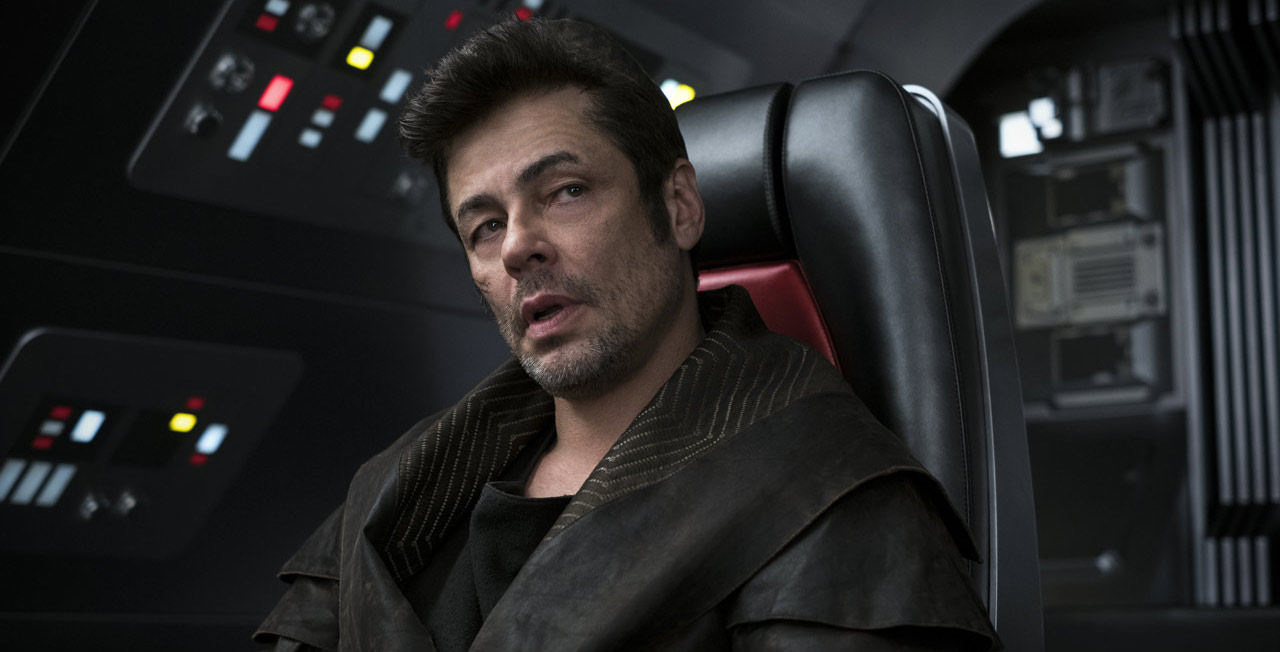
Not repetition, but rhyme
Let's talk about the rogues of the Star Wars universe for a bit, the wildcards outside of the Skywalker dynasty. In the original trilogy we not only had Han Solo to contend with, but in The Empire Strikes Back we make the aquaintance of another dashing doublecrossing scoundrel, Lando Calrissian. While Han Solo never outright betrays Luke or Leia or the Rebellion (it just takes him a while to step outside the neutral zone), Lando does sell his old buddy Han out to Darth Vader and Boba Fett in order to protect himself. It's when Lando realises just how bad the choice he made was that he chooses to do the right thing by his old friend Han, freeing Chewbacca and Leia and helping them escape the clutches of the Empire.
The Last Jedi operated along several similar beats as The Empire Strikes Back, when it introduced to its audience the character of DJ, a codebreaker and thief played by Benicio Del Toro. DJ doesn't believe in the good of the Resistance and the evil of the First Order. He doesn't hesitate to warn Finn that good and evil are collapsable into one. To him, it's all more of the same. To punctuate his own point, he shows Finn how the extremely rich inhabitants of Canto Bight are bankrolling both the Resistance and the First Order by selling both sides of the conflict their weapons and star ships, either to hedge their bets or simply out of greed.
Benicio Del Toro's portrayal is hypnotic, and his camaraderie with BB-8 has the audience believing that there is probably more to this character than his selfish motivations and outlook. He's a dashing scoundrel, right? When he negotiates payment with Rose Tico and Finn, he demands Rose's amulet in payment, a half-moon necklace forged from a precious superconductor metal. The necklace was part of a set which Rose and her sister both wore. Her sister had died for the Resistance, and this necklace represented Rose's last physical link to her sister. In a moment of selflessness, Rose agrees to give DJ her amulet — though Finn, recognising its importance, wants to convince DJ to return it and ask for something else. And eventually DJ does return the necklace, in a scene which makes it look like that was his plan all along — he just needed the precious metal to short-circuit a bit of First Order technology. Rose shares a luminous smile with DJ when she realises he's giving her back her necklace. On first viewing, it's a truly sweet moment, and it really looks like the dashing scoundrel is warming up to Rose and Finn's cause.

Helped by the fact that Benicio Del Toro is super compelling on screen, it's easy to believe that DJ is being swayed to fight the good fight, only for the film to pull the rug out from under us and reveal he sold out Rose and Finn and the rest of the Resistance to the First Order, and leaves them behind to be executed and exterminated in exchange for a hefty payment. DJ may think he's operating in a morally grey zone — perhaps that's how he rocks himself to sleep at night — but the film demonstrates pretty clearly that his self-serving betrayal of Finn and Rose resulted in the deaths of hundreds of Resistance members in the cold darkness of space surrounding Crait. "Neutrality only helps the oppressor, never the victim." [5] The consequences of his choices overshadows other facets of DJ's character, such as his kindness in returning Rose's necklace, or that he admired BB-8 and teased the droid. The film subverts the audience's hope that the dashing scoundrel will eventually do the right thing, like Han Solo or Lando Calrissian did in the previous movies. DJ's not a wholly evil character, but his actions in the film have monstruous consequences. And this rhymes with other narratives in the film, which finally brings us back to Kylo Ren.
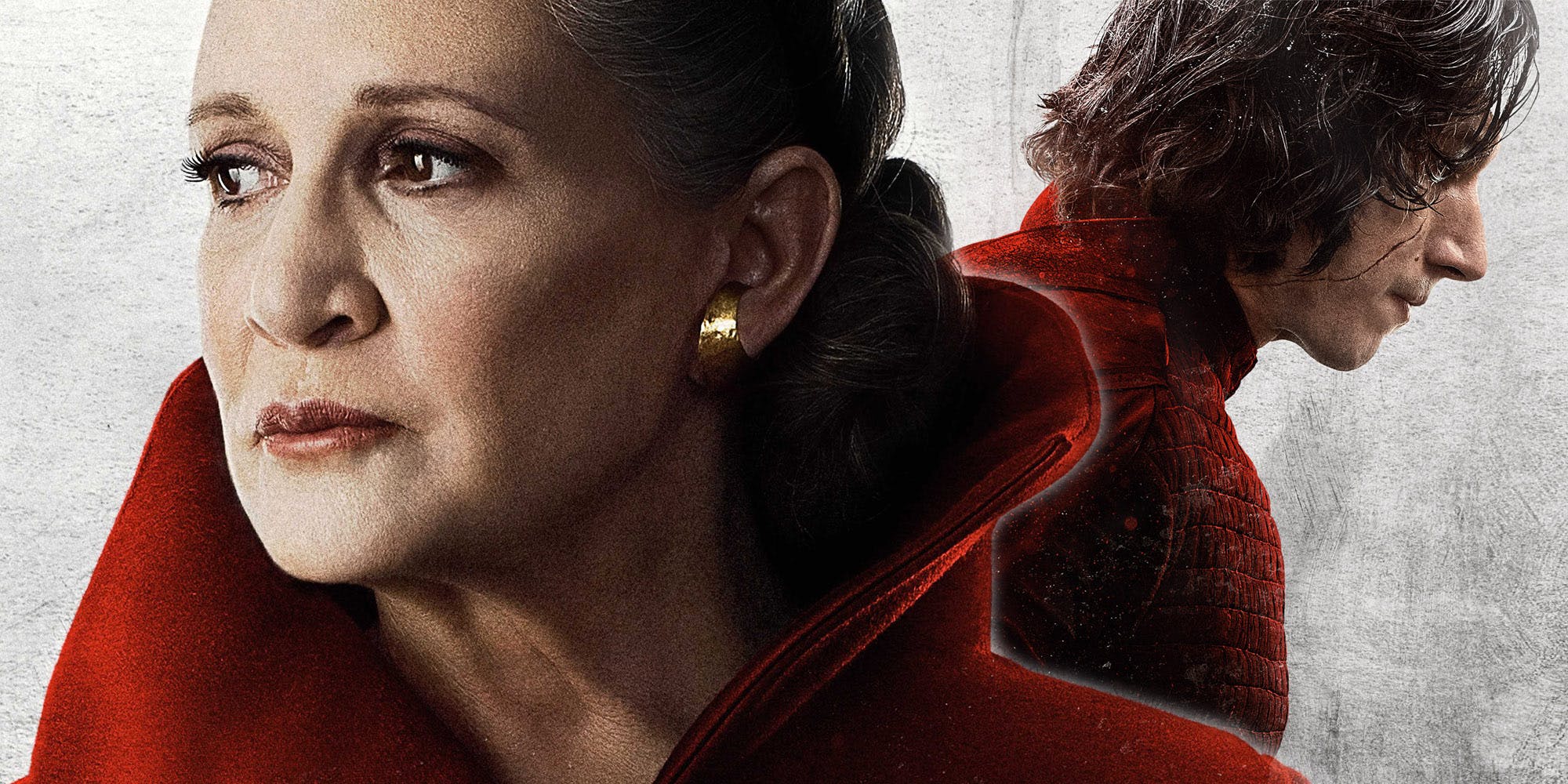
Snoke's shadow
Snoke discovered Ben Solo when he was still very young, and knowing that he was the grandson of Darth Vader, began to subtly manipulate and prime the child to the dark side through psychological manipulation. This echoes how Anakin Skywalker was manipulated by Palpatine. Snoke, without an established Jedi Order to dupe and evade, was able to claw his influence into Ben's mind and heart at a much earlier age than Anakin was. [6] The thing about the The Last Jedi is that one also has to look at it as a piece about a traumatized family that has almost completely fallen apart. Putting aside the political implications of the film and the series for a moment, it is not even a metaphor that Snoke emotionally and mentally abused Ben from an extremely young age, or that Han had no idea it was happening and that Leia was unable to stop it. Snoke likely isolated Ben and routinely tried to sever his connections to the people he loved, exploiting any available insecurity, no matter how ridiculous or small. Even good people, as we know Leia Organa is, can fail. And as we are shown, Luke also failed, though in some ways his failure is much more severe, and its consequences shattered the Skywalker family apart.
Leia trusted that her brother's knowledge and powers in the Force were great enough to shield her son from Snoke. In The Last Jedi, it's revealed that Luke, in a moment of weakness, became convinced that he could not save his nephew from what he could become and tried to kill him in his sleep. Though the temporary murderous impulse fled Luke in moments, it was too late. Ben Solo woke up, and it is very likely that Snoke orchestrated that very timely awakening, and all he saw was his uncle standing over him with a lit lightsaber, and in a reflex of self-defense, Ben lashed out in fear, not only taking down his uncle in an instant, but destroying the rest of the Jedi Temple and even slaughtering the other students who would not leave with him. It's an unmistakable echo of Anakin Skywalker slaughtering the infants and young students in the Jedi Temple during Revenge of the Sith.
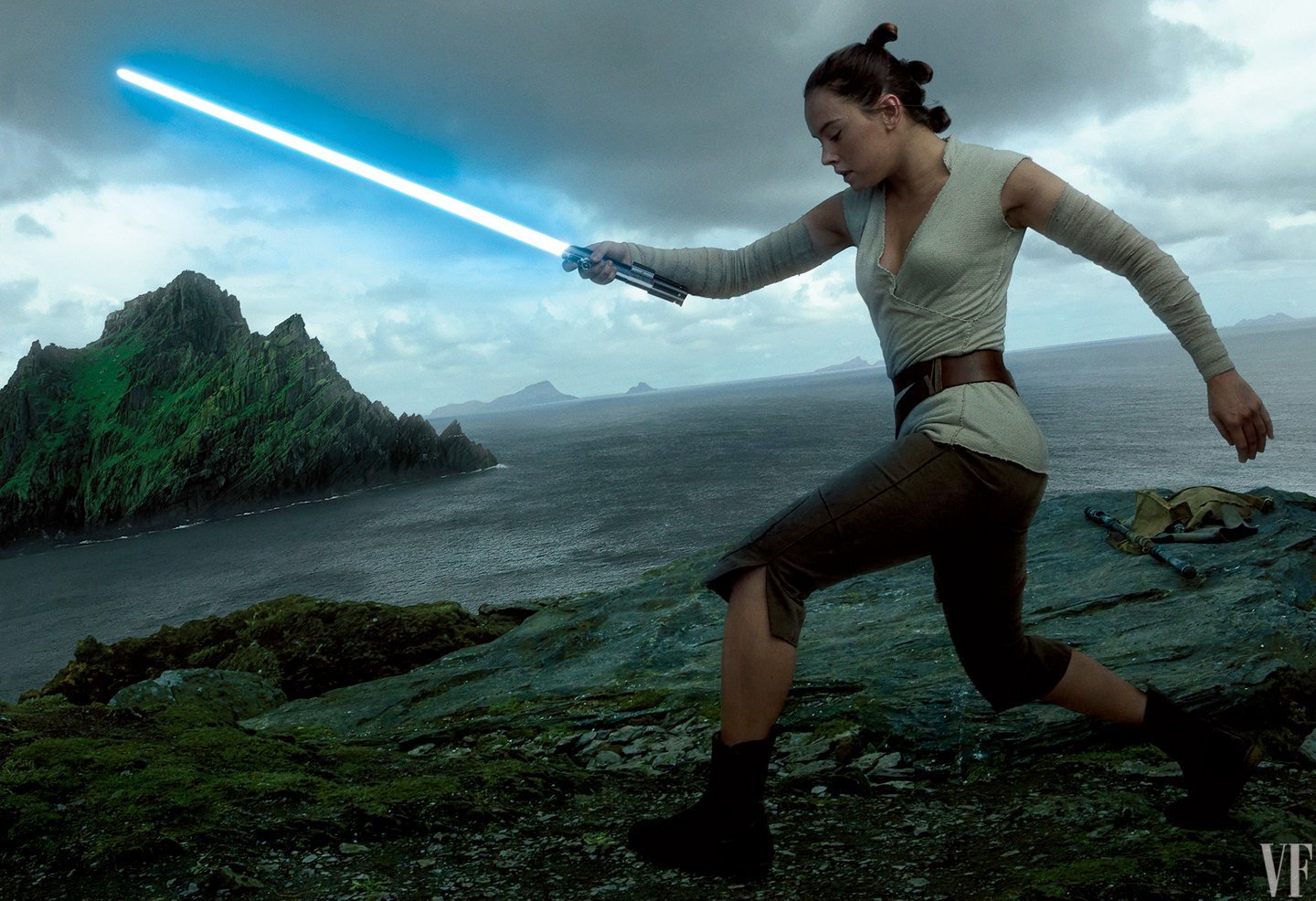
Thematically and narratively, the Force Bond that occurs between Kylo Ren and Rey is a bold choice, though it has its roots in the interrogation scene in The Force Awakens when Rey's Force powers activate and she is able to discern private information from Kylo's mind, exposing the audience to his insecurity and motivations. Since the director and writers of The Last Jedi wanted to create a triangle between the three primary Force users of the new trilogy, they needed a way for Rey to learn more about the history of Kylo Ren and Luke. [7] Luke has shut down by this point, closing himself off from his sister and his friends and the Force. Luke considers his failure to be so total that it has negated any single good thing he ever accomplished, and he is now waiting for death to claim him as the last member of the Jedi religion. In a crucial way, Luke has forgotten the lesson of Star Wars: No one is completely evil. No mistake seals your fate forever.
In the face of this grumpy, angry, depressed man on the far-flung island planet, Rey is rejected by Luke who has vowed to never teach another Jedi ever again, and she has to deal with things like the Force Bond and the pull to the dark side on her own. Through their link, both Rey and Kylo Ren are forced to recognise in each other a certain rhyme in their childhood traumas that resulted in both of them feeling like they were thrown away by their families. The connection punctures through their isolation. Both Kylo Ren and Rey start trusting the bond developing between them, even promising each other that neither needs to feel alone anymore. Inevitably, Rey begins to understand her enemy in a way she couldn't in The Force Awakens.
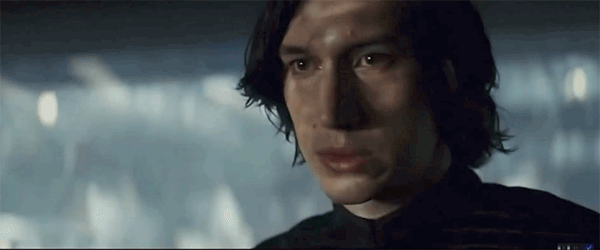
It comes to a head in a scene where Rey demands from Luke, her childhood hero, the truth about what happened between him and Ben Solo, accusing him : "Did you create Kylo Ren?" When Luke finally admits to Rey the truth about what happened, Rey makes a decision. If Luke won't step up out of his wallowing to help her or the Resistance, then she's going to try something else. Rey has not trusted many people in her life as a scavenger on Jakku. But she trusts that she senses the conflict in her enemy, and she trusts that he does not want to be alone anymore.
And that's how you have Rey, not long after she had previously kicked the living daylights out of Kylo Ren in the previous film, surrendering herself to the First Order in order to try and reach him, much like how Luke did at the end of Return of the Jedi.
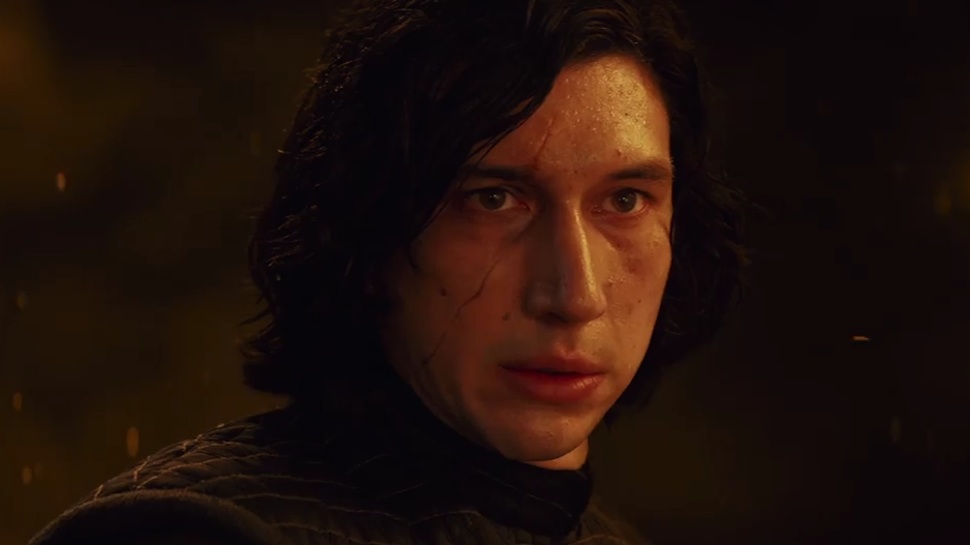
Understanding, not transformation
Han died loving his son even as his son struck him down. Luke died loving his nephew. Leia still loves her son in the events of The Last Jedi — it's written plainly on her heartbroken face, even as she asks her brother if he thinks her son is beyond saving. Luke's last words to her imply that no one is beyond redemption, though Ben is beyond Luke's power to bring home. In many ways, The Last Jedi is a movie about a family who has to deal with a family member who was abused and who now perpetuates the cycle of abuse by taking out all of his hurt on the people he loves most in the most terrible, violent, and deadly ways.
I don't think it's true in every case, but I think for some folks the fantasy of Kylo Ren/Ben Solo as a character is not solely rooted in the Beauty and the Beast-style saviour fantasy. It's also rooted in the hope of an abusive loved one finally healing enough that the cycle of abuse ends, as much for their sake as for the sake of all the people who love them. It's about the fact that a lot of abused children love their abusive parents. It's about the fact that a lot of survivors of domestic violence love their abusers. It's about the fact that it is possible to deeply love someone who has done horrible things and who is a monster.
The line between victim and abuser is messy. At what point does Ben Solo stop being a victim and truly become Kylo Ren? There was probably no single event — just as Darth Vader was not created in a day, neither was Kylo Ren. But at some point, Kylo Ren started chosing power and hurting other people, and he kept making that choice, even when it was no longer in self-defense. Even when it meant killing his own father. Even if it meant letting hundreds, thousands, millions of innocents die.
But there was no clearer moment to me than in Rey and Kylo Ren's dialogue in the Supreme Leader's chambers, after Rey and Kylo Ren destroy Snoke and his guard, that Kylo Ren is still stuck in the vortex of abuse. He tells Rey that she is a nobody, except to him. It's possible he isn't even aware what he's doing, applying the same kind of twisted and profoundly hurtful manipulation that no doubt Snoke used on him his entire life.
“They were filthy junk traders, sold you off for drinking money. They're dead in a pauper's grave in the Jakku desert. You come from nothing. You're nothing, but not to me.”
Kylo Ren/Ben Solo to Rey in The Last Jedi
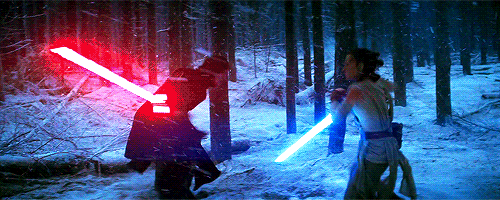
When Luke tells Rey "This isn't going to go the way you think," the sentence carries extra meanings from a film director who is expecting his audience to respond to the Rey and Kylo Ren relationship in a particular way. He's speaking to the audiences who may not be expecting the alliance between Rey and Kylo Ren. He's also speaking to those who ship Rey and Kylo Ren together, telling them to look beyond the surface of a good-looking heteronormative pairing that undoubtedly works well on screen.
When Rey reached Luke in his exile, she came to the understanding that her hero Luke Skywalker is not perfect and that he can and has failed. She also discovered through the Force Bond that there was conflict in Kylo Ren. She discovered the lesson from Return of The Jedi, that no one is wholly good or evil. We all make mistakes, just as we can all do better.
Luke might have failed Kylo Ren, but Rey did not. Rey performed an extraordinary leap of faith — in her own abilities against Snoke, in Kylo Ren's compassion towards her — to try to save him. But after Rey and Kylo Ren team up against Snoke and Kylo Ren proposes that she joins him, Rey realises that she can't transform Kylo Ren. She can't heal him. At this point, only he can choose to stop hurting people. Comparing The Last Jedi to Return of the Jedi, perhaps Kylo Ren is even further gone than Darth Vader ever was. Or perhaps Kylo Ren is a possible answer to the question of what could have happened if Darth Vader had survived killing Emperor Palpatine to save his son. Kylo Ren's plunge into the Dark Side as he now takes the mantle of Supreme Leader is even further symbolised in Anakin Skywalker's shattered lightsaber.
In their very last scene together, through a Force Bond after both Snoke and Luke Skywalker are dead, Kylo Ren is kneeling on the ground and looking up to Rey, who gives him a final stare. Her eyes are understanding, but her face is determined as she shuts the door on their Force Bond. By choosing the dark side of the Force of his own free will outside of Snoke's control, Kylo Ren is beneath her. His actions matter. What he does matters. Kylo Ren has proven to himself that he is a monster.
In Star Wars, as in real life, that does not necessarily mean he is beyond redemption. But perhaps, the monster can save his own damn self for once.
TV Tropes Draco In Leather Pants ↩︎
"We must take sides. Neutrality helps the oppressor, never the victim. Silence encourages the tormentor, never the tormented. Sometimes we must interfere. When human lives are endangered, when human dignity is in jeopardy, national borders and sensitivities become irrelevant. Wherever men and women are persecuted because of their race, religion, or political views, that place must - at that moment - become the center of the universe." — Elie Wiesel, Night ↩︎
Leia tells Han everything about Snoke's influence on Ben's fall to the dark side in the canon novelization of The Force Awakens: “(Snoke) knew our child would be strong with the Force. That he was born with equal potential for good or evil.” “You knew this from the beginning? Why didn’t you tell me?” She sighed. “Many reasons. I was hoping that I was wrong, that it wasn’t true. I hoped I could sway him, turn him away from the dark side, without having to involve you.” A small smile appeared. “You had— you have— wonderful qualities, Han, but patience and understanding were never among them. I was afraid that your reactions would only drive him farther to the dark side. I thought I could shield him from Snoke’s influence and you from what was happening.” Her voice dropped. “It’s clear now that I was wrong. Whether your involvement would have made a difference, we’ll never know.” He had trouble believing what he was hearing. “So Snoke was watching our son.” “Always,” she told him. “From the shadows, in the beginning, even before I realized what was happening, he was manipulating everything, pulling our son toward the dark side. But nothing’s impossible, Han. Not even now, at this late time. I have this feeling that if anyone can save him— it’s you.” ↩︎
"So I knew I wanted them to talk, and to talk enough to where we could go from “I hate you,” to her being forced to actually engage with him. That’s where the idea of these “Force connections” came from, which is kind of a new thing. It’s a little bit of a riff on what happens with Vader and Luke at the end of “The Empire Strikes Back,” but it’s entirely new in some regards." LA Times, "Q&A Rian Johnson on the evolution of the Force in 'Star Wars: The Last Jedi' and more spoilers" (Though — STAR WARS NERD ALERT — Force Bonds totally existed in-universe before excuse you Rian Johnson) ↩︎
